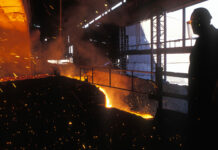
[miningmx.com] — INTERNATIONAL Ferro Metals (IFM) has pulled back on its expansion plans because of depressed conditions in the ferrochrome markets.
IFM CEO David Kovarsky said in his review for the year to end-June that the feasibility study started in 2008 to look at commissioning three new furnaces had been amended to consider the “potential commissioning of up to two new furnaces.’
Said Kovarksy: “The study is expected to be finalised by the beginning of 2011.
“With the Medupi power station commissioning expected late in 2012, it is likely that expansion electricity supply will be granted by Eskom around that time.
“The feasibility study is expected to be put to the Board by June 2011 at which time a decision on the expansion should be made.’
IFM managed to reduce its losses for the year to end-June to R157m ( previous financial year – R456m loss) as revenues nearly doubled to R1.4bn (R782m).
Ferrochrome is used almost exclusively in the production of stainless steel.
According to Kovarsky international stainless steel production fell to 25.4 million tonnes last year from 28.3mt in 2007 and the consumption of high-carbon ferrochrome tracked this trend dropping to 6.7mt from 7.6mt over the same period.
He pointed out the sector had since bounced back with 2010 global stainless steel production expected to hit a record level of 30.8mt and ferrochrome production expected to hit a matching record level of 8.3mt.
Kovarsky said IFM’s focus was on cost reduction to ensure it would be profitable at low ferrochrome prices given the company’s cautious outlook on the market in the short-term.
He “the company’s objective is to be below the median of South African production costs.
“Management is strongly focussed on reducing production costs at the mine and the plant and to reduce general corporate overheads.
“The company has made tremendous inroads in reducing unit costs by 8% over the year and, with its cost reduction programme; the start-up of the co-generation plant and the UG2 agreement, the costs are expected to decline further.
“Moreover, if the furnace expansion plans are approved this will allow the Company to reduce its average cost of production by utilising technologies that yield lower costs.’











